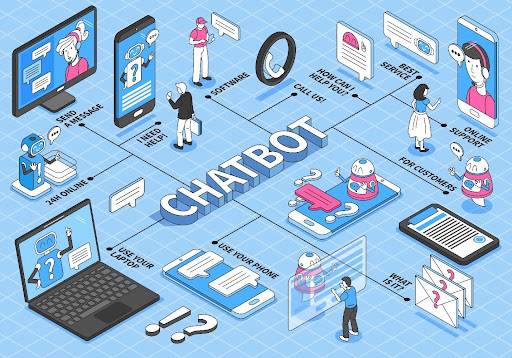Artificial intelligence developments are fundamentally altering company models, and chatbots are gradually taking on increasing importance in customer support channels. A.I. and machine learning make recognizing the substance of client requests, queries, and service inquiries possible. Chatbots continue to gain in popularity as messaging applications overtake social media networks in terms of use.
A company must adjust to the requirements and desires of its customers before using more effective methods to serve them. By allowing consumers to contact the business through messaging apps, email, or SMS, chatbots are transforming how businesses interact with their clients and fostering brand loyalty.
Customer Service Chatbots
A single bad customer service encounter might turn off potential clients. According to research by Business Insider Intelligence, 60% of U.S. shoppers have abandoned an intended purchase because of lousy customer service, which may cost U.S. retailers billions of dollars in lost sales.
Online customer service has improved users’ propensity to connect with firms electronically since customers have many alternatives. A 24/7 chatbot that handles customer care is a solid and affordable approach to providing customers with basic help since convenience is a crucial part of the customer experience.
Customers should get the same quality of assistance as they would from a representative. Still, if a problem becomes too complicated, the client may be sent to a natural person. Chatbots used for customer service often respond to questions using keywords. Chatbots can now ask questions, provide context and intent, and provide better customer service thanks to advances in AI.
Chatbots For Virtual Assistants
A virtual assistant chatbot (VAC) and a customer service chatbot (CSR) have different purposes. Its core technology is comparable otherwise. Virtual assistant chatbots (VACs) help with business, education, government, healthcare, and entertainment applications by giving information, services, and help with websites.
Specific virtual assistants are utilized to assist company personnel than clients outside the company. VACs may do various actions to help organize an office, like making lists, setting reminders or appointments, launching the software, or turning on intelligent devices. They may all be managed via text or voice commands.
What Use Does Artificial Intelligence Play in Customer Support?
A smooth, customized customer journey is created using artificial intelligence (AI) technology, starting with a prospect’s first web search and continuing through your follow-up marketing, the first sale, and all subsequent interactions. You integrate and utilize all the behavioral data you’ve gathered along the route to reduce friction at every touchpoint.
Your buyer’s journey is one of many aspects of an intelligent customer experience that is made more accessible. It also helps your team work better and faster thanks to intelligent routing, insights from AI, and prompts, as well as chatbots and voice assistants that make the work easier.
The Importance of Customer Experience
If a consumer has a positive experience with your business, you will likely gain their repeat business and maybe even their recommendations. But, this will only happen if you continue to engage with them and provide consistently top-notch service.
Certain Ways AI Enhances Customer Experience
The usage of AI in businesses has grown significantly in recent years. According to the Big Data and AI CEO Survey 2021 by NewVantage Partners, 77% of respondents use AI in some capacity, and 96% of them report that it has helped them achieve successful results, an increase of 25% from 2020. Your company benefits in a number of ways when you create an AI customer experience:
Save clients’ time and money.
The consumer experience is improved via chatbots, virtual assistants, and in-app communications APIs. According to our most recent Global Consumer Engagement Study, AI can help companies provide more satisfying customer experiences.
Engage Clients With Fresh Sales Chances
By providing individualized product suggestions and exclusive deals, AI may encourage more purchases. Based on previous purchases, it may inform clients when it’s time to place another order.
Boost the retention of customers
According to the Global Customer Engagement Report 2022, 53% of consumers will increase their loyalty to a company after a positive customer experience. Similarly, 36% of buyers anticipate making more purchases.
Boost personnel productivity
AI frees up human agents to concentrate on their core strengths and insights that help them perform more effectively by intelligently routing consumers, qualifying sales leads, and unloading customer support responsibilities.
Decide Based on Data to Enhance Client Experience
The customer experience is being improved by your AI-powered solutions, but they are also collecting and analyzing data that might help you better understand the customer journey and spot pain areas that can result in customer turnover.
Which AI customer experience solutions are the most valuable?
Virtual Helpers
AI-driven virtual assistants can replace phone trees with conversational, intelligent routing, so clients don’t have to listen and reply to lists of alternatives to (hopefully) reach the proper agent. Instead, users just state their needs to the virtual assistant, and AI connects them to the proper person using that information and customer history data. The virtual assistant may also give easy answers, help, and even finish transactions based on your integrations.
Chatbots
Chatbots are like virtual assistants. They may provide information, respond to queries, and allow self-service. By adding them to your website, app, and social media channels, customers can talk to your brand anytime and get quick answers to their questions without leaving your content or product listings.
Hence, take into account including chatbots in:
Get rid of wait times: AI-powered chatbots may assist in reducing hold times, especially for frequent queries.
Establish 24-hour sales and customer service: Chatbots anticipate queries and provide suitable products and alternative suggestions. Consider it a step forward to offer shipping information, check stock, size, or color, or direct them to a tailored in-store visit. The ongoing in-channel interaction may support clients through the buying cycle.
Sentiment Assessment
Sentimental evaluation A customer’s emotions may be seen in real-time thanks to AI bots that listen in on discussions. This may let you know when they’re interested or irritated. During interactions with a chatbot or virtual assistant, if the AI senses that the person is getting more annoyed, it may call a human right away. Also, it might include a knowledgeable supervisor if clients are dissatisfied with the agent’s service. Vonage’s Sentiment Analysis solution also gives managers the information they can use to teach their teams better and improve the customer experience. It also gives agents clear, real-time feedback to help them improve their skills.
Language Recognition
Speech synthesis AI takes advantage of natural language processing to comprehend clients’ needs and provide conversational responses. It drives everything, including IVR, chatbots, virtual helpers, and call transcription. Speech recognition can be used to make sure a customer is who they say they are and to give them access to their account information and self-service options.
Use AI in your company to begin seeing results.
A short while ago, big tech businesses with significant expenditures were the only ones using AI. It now powers all the services and applications we use daily. All organizations can provide an AI customer experience, but different enterprises have different use cases.









